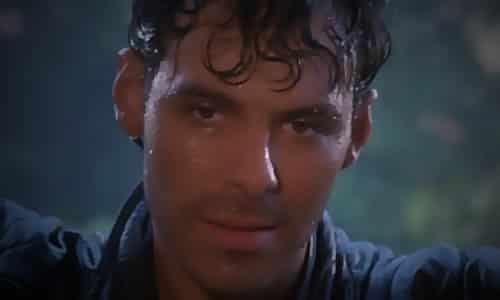STEWART KING talks to actor Sean Chapman about his thoughts on horror, violence in society, his life in movies and his most famous role – Frank Cotton in Clive Barker’s Hellraiser

STEWART KING: Your contribution to iconic horror movies is beyond reproach. Do you still keep your finger on the horror pulse and, if so, which movies or books have you enjoyed recently?
SEAN CHAPMAN: I’m happy to say I’m actually quite squeamish and, yes, I still enjoy good horror. I remember having that electrifying chill ripping along my spine when I saw the original Amityville Horror in the cinema. Like most people I find the concept of genuine evil fascinating and repellent and, to this day, I’ve never been able to watch The Exorcist. But slasher and gore fests don’t touch me at all. It’s the psychological aspect of horror, emerging from within human actions, that rattle my cage. Hitchcock’s Psycho strikes me as an almost perfect cinema experience; intriguing, beguiling and exquisitely paced. It’s still genuinely chilling after all these years. That’s what drew me to Hellraiser, I guess, the intricacy and elegance of the plotting; plus I thought Frank was a cool dude from the outset. I loved the dark sensuality of the character; his tortured soul as it were … In purely modern terms I love the interweaving of sensuality and fear in Angela Carter’s fiction. I also have a favourite recording of Bartok’s opera Bluebeard’s Castle; now THAT’S scary.
STEWART: Having appeared at the National Theatre and West End and graced movies as diverse as Hellraiser, The Sea Change and Joy Division do you experience episodes that other actors fall foul of when you struggle to retain your identity?
SEAN CHAPMAN: Actually it’s not the different roles one plays as an actor that test one’s sanity, it’s the gaps and longueurs between work. As I get older they become increasingly agonising. One of the reasons I enjoy writing fiction is the autonomy; to be free to work when I choose to, and not to be in the hands of others. But more generally all the good actors I know are very grounded and rational people. You have to be in order to cope with the profession. Hysterical luvvies tend not to last too long. My first novel A Distant Prospect is actually about this very subject, staying sane in the maddest profession on earth.
STEWART: You’ve appeared in some very hard-hitting movies. ‘Scum’ with Ray Winstone and ‘Made In Britain’ with Tim Roth. Do you think audiences are becoming more desensitised to this sort of non-theatrical violence? Do you still think it’s possible to shock?
SEAN: Most violence today on screen is essentially cartoonish and ridiculous. The prevalence of CGI and explosive special effects makes such moments inconsequential and unbelievable. That’s very damaging as audiences watch cardboard characters go to cardboard deaths. It’s alienating and cheapens human life. I’d argue that the violence in Scum, Contact or Made In Britain is bitter, fast and truly devastating. People wince when they see it. The cold blue English light, the rawness of the action and sound in these films all contribute to their power. I’m sure Scum did a good job of keeping a lot of people out of Borstal and prison. They saw the film and thought; ‘No thanks.’ But modern Gangster films that glorify pointless, unmotivated violence among one-dimensional characters do desensitise their audiences, I’m sure. In good storytelling violence is always a last resort, and only then does it become justifiable or meaningful. It has to be earned in terms of the overall story, and even then it and should never be deemed ‘entertaining’. In the films you’ve mentioned the violence is actually very contained and minimal; the lead characters are trying to escape their circumstances, not to glory in them. There’s a huge difference between a hero and a thug.
STEWART: Were you a fan of Clive Barker’s work before you appeared as Frank in Hellraiser?
SEAN: I can honestly say I’d never heard of Clive Barker. He was a minor cult figure when we made the movie and the film of Hellraiser really put him on the map- as he deserved. I found him a delight to work with; intelligent, unpretentious and of course incredibly creative. Clive wrote the novel, the screenplay and then directed the film! We both knew instinctively where the character of Frank came from. I remember visiting the workshops where the makeup and special effects were being put together and thinking, wow, this could really be something …
STEWART: How many days shooting were you required for?
SEAN: I was originally scheduled to do just a few days, but the producers in the States liked my rushes. The role got gradually built up. Clive came to my trailer one morning and said my extra (uncontracted) days meant I was earning more than he was… I somehow doubt that, but hey.
STEWART: It’s a great part and the character has a dark presence throughout the movie. Is it still a role that you can use as currency or have you now tired of the association?
SEAN: On the page, there was really just the essence of a character and so I’m very proud of my contribution to the film and of the way the character lives onscreen. I think the movie is exceptional, especially when you consider the budget. The horror is based in sexual and erotic needs and I think it explores those themes very powerfully. People always want to talk about that movie; everyone has a response to it. I never grow tired of it, it was a pleasure to work on.
STEWART: You now have a brand new intelligent and chilling erotica book out called ‘Ms Derby Requires’ published by Endeavour Press. Can you tell us how you came to write it and something of what you were trying to achieve with the story?
SEAN CHAPMAN: My short story collection Ms Derby Requires has a subtitle; Four Dates with God, Sex and Death. The title story is explicitly erotic, the others have less of an overtly sexual theme though I like to think they are all sensually charged, like life itself. The title story was inspired by an early piece of Ian McEwan’s, called Pornography. He linked the everyday world of a Soho bookshop with something much darker and intense. As a writer, I’m intrigued with what lies beneath the surface activity we’re all necessarily engaged in. Unspoken motivations, desperate needs, the torments of desire. Most erotica is content to simply describe a scenario and the actions it gives rise to. I wanted to explore the mystery of sensual passion, its irrationality and sheer bloody awkwardness. But also, as I get older, I find it vital to express and explore such themes. Sexuality is bound up with religion and Thanatos; what Freud called the death instinct or fixation. Most porn cheapens and dilutes the incredible strangeness and potency of sexual desire. I wanted to write something that touched on what is termed perversity but which is in fact very normal. Alain de Botton writes very persuasively about the daily ‘madness’ and ‘incoherence’ of fetishism and desire in his book We Need To Talk More About Sex. I’m intrigued by that tension; the social containment of the privately uncontrollable.
STEWART: Are you currently writing a new book and will this be in a similar vein?
SEAN: Yes, after studying at the Faber Academy in 2011 I have recently completed a new full-length novel The Blood In The Moon, and it does indeed have some themes allied to the Ms Derby story. It’s a psychological thriller with hints of The Magus by John Fowles and Atomised by Michel Houellebecq. It explores the pagan instinct in modern man and the battles between fathers, sons and assorted lovers…
STEWART: If you now had to choose between the stage or the solitary existence of a writer which would you opt for?
SEAN: This is a tough one. Nothing beats being in a great play with great actors or making a wonderful film, with all the team spirit these need. But finding a plot and various characters coming to life under one’s fingers as one writes is a mystical and astonishing experience. Putting the last full stop on the first draft of a completed novel is an ecstasy all of its own. Above all, I relish the autonomy of the writing life, the ability to fall out of bed and just work and create without waiting for someone else’s permission. That excites me every day. I wouldn’t remotely want to be an 80-year-old actor waiting for the phone to ring, but I’d love to still be writing at that age.
STEWART: If you were to sit down and watch a classic horror movie double bill tonight which two would you choose?
SEAN: The Devil Rides Out, a wonderful old Hammer horror which manages to be terrifying and oddly comforting like an old episode of Dr Who, and the original 1963 black and white version of The Haunting. Just thinking about it makes my hackles rise … The weird camera angles, the uncertain point of view; superb.
STEWART: What is the strangest piece of direction you’ve ever been given?
SEAN CHAPMAN: Probably just before doing the riot scene in Scum. All Alan Clarke said was, ‘Just smash the place to bits lads, have some fun.’ Some people got seriously mullered doing that scene.
STEWART: Finally, what is your finest recollection of movie excess?
SEAN: Standing with Michael Caine on the Ipswich docks as a squadron of black helicopters were flown in during the making of The Fourth Protocol. I was playing a SAS officer. Big Mike turned to me and asked; ‘Do you like helicopters, Sean?’ Before I could reply he went on, ‘I find they come in very handy when you want to avoid the traffic.’


